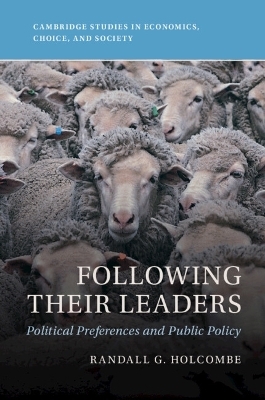
Following Their Leaders
Political Preferences and Public Policy
Seiten
2023
Cambridge University Press (Verlag)
978-1-009-32319-2 (ISBN)
Cambridge University Press (Verlag)
978-1-009-32319-2 (ISBN)
Models of democratic decision-making tend to assume that voters have preferences, and that candidates conform to those preferences. In reality, voters adopt the policies of those political elites - they follow their leaders. Policies are designed by the elite and the masses have little influence over them.
Models of democratic decision-making tend to assume that voters have preferences and that candidates adjust their platforms to conform with those preferences; however, the direction of causation is largely the opposite. Political elites offer policy platforms to voters, and voters adopt those policies - they follow their leaders. Following Their Leaders argues that policies are designed by the elite and the electorate has little say. Preferences for public policy tend to be anchored in a political identity associated with a candidate, party, or ideology; voters' preferences on most issues are derived from their anchor preferences. Holcombe argues that because citizens adopt the policies offered by the elite, democratic institutions are ineffective constraints on the exercise of political power. This volume explores political institutions that help control the elite who exercise political power and discusses the implications political preferences have on democracies.
Models of democratic decision-making tend to assume that voters have preferences and that candidates adjust their platforms to conform with those preferences; however, the direction of causation is largely the opposite. Political elites offer policy platforms to voters, and voters adopt those policies - they follow their leaders. Following Their Leaders argues that policies are designed by the elite and the electorate has little say. Preferences for public policy tend to be anchored in a political identity associated with a candidate, party, or ideology; voters' preferences on most issues are derived from their anchor preferences. Holcombe argues that because citizens adopt the policies offered by the elite, democratic institutions are ineffective constraints on the exercise of political power. This volume explores political institutions that help control the elite who exercise political power and discusses the implications political preferences have on democracies.
Randall G. Holcombe is DeVoe Moore Professor of Economics at Florida State University. He served on Florida Governor Jeb Bush's Council of Economic Advisors from 2000 to 2006, and is past president of the Public Choice Society and the Society for the Development of Austrian Economics.
1. Introduction; 2. Instrumental and Expressive Preferences; 3. Influences Over Preference Formation; 4. Preference Aggregation Through Voting; 5. The Formation of Political Preferences; 6. Anchor Preferences and Derivative Preferences; 7. Preferences of Elites and Masses; 8. Policies that Maximize Political Power; 9. Patriotism, Propaganda, and the Public Interest; 10. Implications for Democracy.
| Erscheinungsdatum | 13.03.2023 |
|---|---|
| Reihe/Serie | Cambridge Studies in Economics, Choice, and Society |
| Zusatzinfo | Worked examples or Exercises |
| Verlagsort | Cambridge |
| Sprache | englisch |
| Maße | 151 x 227 mm |
| Gewicht | 380 g |
| Themenwelt | Sozialwissenschaften ► Politik / Verwaltung ► Staat / Verwaltung |
| Wirtschaft ► Volkswirtschaftslehre ► Wirtschaftspolitik | |
| ISBN-10 | 1-009-32319-9 / 1009323199 |
| ISBN-13 | 978-1-009-32319-2 / 9781009323192 |
| Zustand | Neuware |
| Haben Sie eine Frage zum Produkt? |
Mehr entdecken
aus dem Bereich
aus dem Bereich
Organisationen steuern, Strukturen schaffen, Prozesse gestalten
Buch | Softcover (2024)
Rehm Verlag
38,00 €
Grundzüge der öffentlichen Auftragsvergabe
Buch | Softcover (2022)
Springer Fachmedien Wiesbaden GmbH (Verlag)
14,99 €


